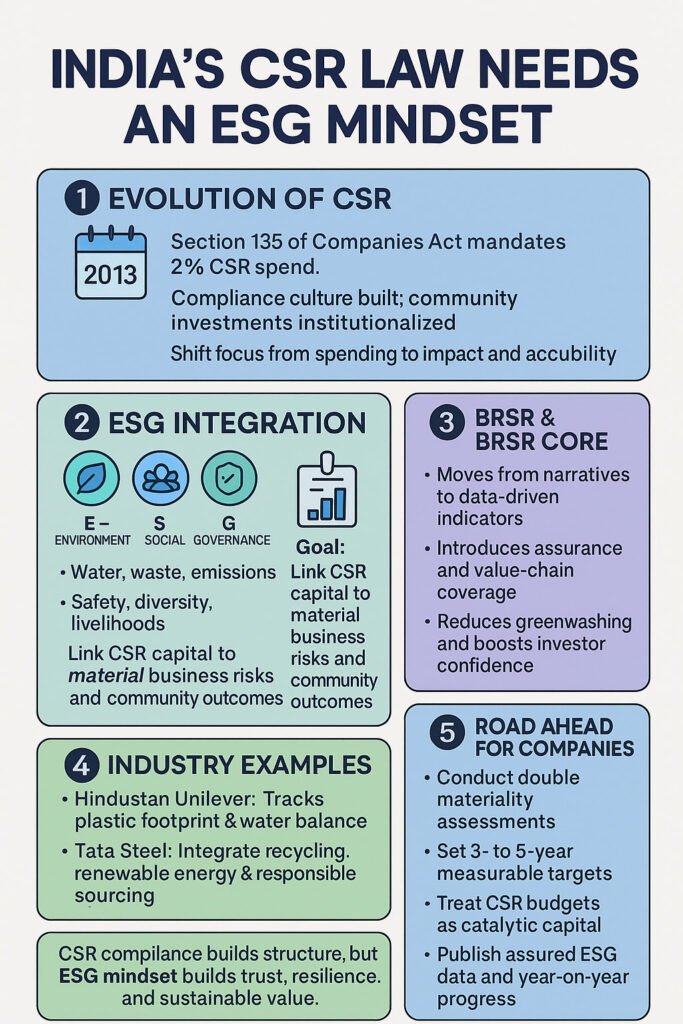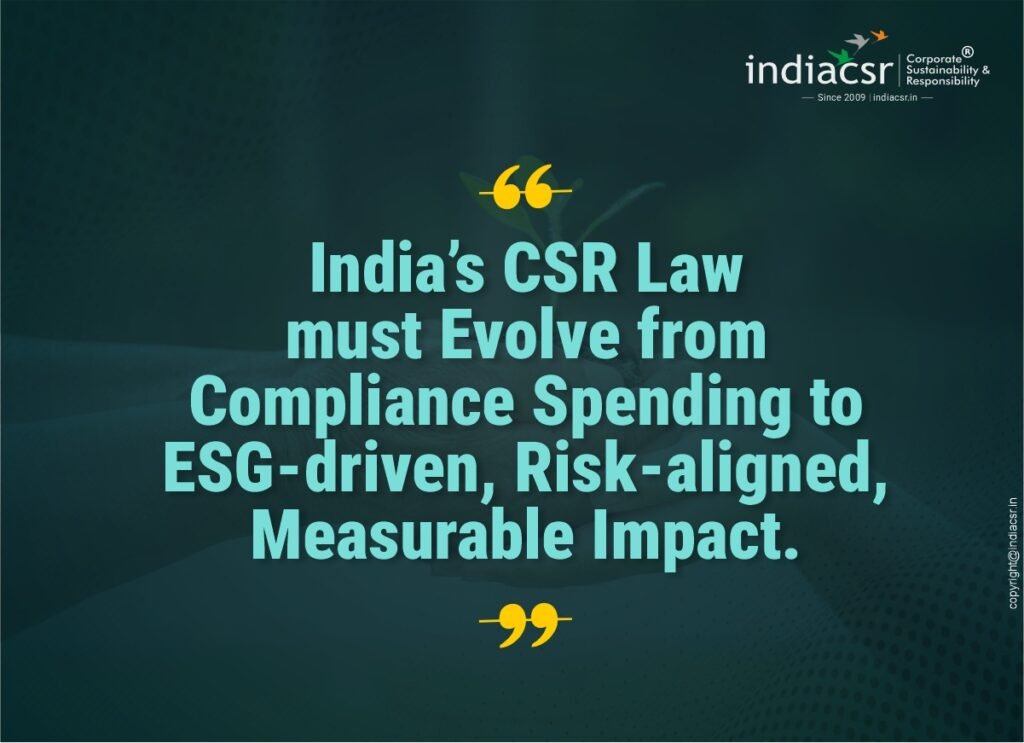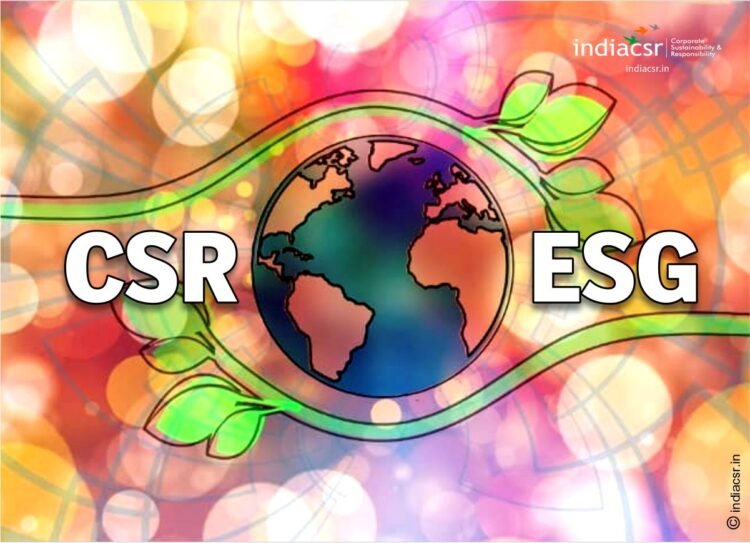Integrating ESG into CSR Marks the Next Leap Toward Responsible, Transparent and Risk-Resilient Corporate Leadership
By Dr Sanjay Bhardwaj & Anirudh Saini
India’s corporate responsibility framework has matured into a sturdy compliance scaffold, but the next leap in value creation depends on adopting an ESG mindset that links CSR capital to material risks, measurable outcomes, and assured, comparable disclosures across the value chain. Section 135 of the Companies Act laid the foundation by requiring eligible companies to constitute CSR committees and spend at least 2% of average net profits on approved activities. This embedded governance discipline and a baseline of community investment across sectors. In parallel, SEBI’s Business Responsibility and Sustainability Reporting regime has shifted the market from narrative claims to decision-useful indicators. It aligns Indian disclosures with global norms and integrates sustainability within annual reports for the top 1,000 listed entities.
Compliance is necessary but not sufficient. A compliance-only posture can leave both community outcomes and enterprise resilience under realised. The ESG mindset reframes CSR from philanthropic spending at the perimeter of the business to catalytic capital targeted at the firm’s most material issues. It is guided by double materiality, time-bound targets, and assurance-ready metrics that lenders and investors recognise. BRSR Core is accelerating this shift by introducing assurance on selected key performance indicators and by phasing value chain coverage. It extends accountability beyond corporate boundaries to suppliers and logistics, which is where many environmental and social risks and opportunities actually concentrate. Assurance reduces the risk of greenwashing and improves reliability. Better data reduces information asymmetry. This enables capital providers to price risk more accurately and to reward credible transition plans with improved access to sustainability-linked instruments.
This architecture is already changing practice. In consumer goods, a leading FMCG company connects Extended Producer Responsibility obligations with transparent data on plastic footprint, collection and processing, and water replenishment in stressed catchments. The company’s reporting shifts attention from rupees spent to outcomes achieved in priority locations. Stakeholders can see ratios such as plastic recovered relative to packaging footprint and location level water balance. These indicators communicate community benefit and operational risk management at the same time.
In heavy industry, a steel conglomerate integrates plant level efficiency and recycling investments with targets for water intensity, discharge quality, and basin level replenishment within a four pillar stewardship approach. The company discloses initiatives on waste heat recovery, renewable integration, supply chain emissions, and supplier assessments against responsible sourcing codes. These examples illustrate how ESG priorities can unify CSR, operations, and procurement. The result is that community outcomes are explicitly linked to enterprise resilience.

Boards can convert these lessons into a practical roadmap. The starting point is a robust double materiality assessment that identifies financially material topics and significant impacts across emissions, energy, water, waste, safety, diversity and inclusion, and labour practices in the supply chain. From there, companies should set three to five year targets with clear baselines, named owners, budgets, and alignment to BRSR indicators. This preparation anticipates assurance scopes and the data quality that will be required. CSR budgets should be repositioned as catalytic capital. They should fund pilots, community partnerships, and supplier enablement that directly de-risk operations.
For water-stressed plants, that means catchment stewardship, recharge structures, and demand side efficiency that reduce curtailment risk and improve basin level balances. For supply chains with Scope 3 hotspots, that means building MSME supplier capabilities on quality, safety, and emissions measurement and reduction. Controls must keep pace. Internal audit coverage should expand to emissions inventories, water balance, safety data, waste traceability, and supplier social metrics. This strengthens readiness for BRSR Core assurance and for forthcoming value chain disclosures. Reporting must support comparability. Companies should present year-on-year trends, normalised intensities, target progress, and variance explanations in their BRSR filings. They should cross reference this information in the integrated report or in the management discussion and analysis so that stakeholders can evaluate trajectory rather than isolated achievements.
Moving beyond compliance also requires a different way of describing performance. Activity counts rarely help decision makers. The focus should move from the number of trainings to outcomes that connect to risk and resilience. Companies can disclose lost time injury frequency rates, near miss culture indicators, coverage of contractor audits, and the percentage of corrective actions closed on time. These indicators should be accompanied by methods and boundaries that allow assurance and year on year comparison.
For water-stressed sites, community projects should be tied directly to the risk register. Investment in recharge structures, catchment governance, and household or farm efficiency has dual benefits. It reduces local vulnerability and lowers the probability of operational curtailment. Transparent baselines and replenishment factors are needed for credibility. Where policy drivers are salient, such as extended producer responsibility, renewable purchase obligations, and waste and hazardous material rules, CSR portfolios can be designed to strengthen compliance readiness and deliver social co benefits. This creates a coherent story that links regulation, investment, and outcomes.
Mid-caps and unlisted companies should not wait for mandates to evolve. Lenders and anchor customers are already cascading ESG data requests, and early adoption of BRSR aligned metrics can improve credit dialogue and supply chain attractiveness, particularly where tier one buyers face assurance requirements. Practical early steps include publishing a concise ESG fact sheet alongside statutory reports, piloting limited scope assurance on a small set of high materiality KPIs and setting up lightweight data systems that can scale as requirements tighten.

As BRSR Core phases value chain coverage into the mainstream, supplier engagement on emissions, energy, safety, wages, and grievance mechanisms will become central. CSR budgets can co-fund supplier measurement and improvement. Standardisation of supplier disclosures and digitisation of data collection will reduce assurance frictions over time.
Guardrails against greenwashing must be spelled out. Claims should be anchored in assured KPIs, and companies should avoid cherry picking pilots that lack baselines or scale. Methodologies and system boundaries should be disclosed. Limitations should be acknowledged openly, and next steps should be clear. Governance should be visible. Boards should link material sustainability metrics to risk management and, where appropriate, to remuneration.
Audit committees should review controls around non-financial data with rigour comparable to financial reporting. Markets reward credibility. Consistent and assured ESG data reduces information asymmetry, supports better pricing of risk, and improves access to green bonds and sustainability linked loans that require transparent transition plans and tracked outcomes. As value chain disclosures illuminate Scope 3 exposures and supplier practices, companies that manage these issues proactively will be better positioned with both banks and institutional investors.
India’s CSR law provided the scaffold. BRSR and BRSR Core supply measurement and verification. The competitive edge now lies in using CSR capital to accelerate material ESG outcomes that strengthen resilience and expand access to capital. Companies that operationalise this mindset will report fewer line items of spend and more evidence of risk reduction, resource productivity, and community results. Stakeholder confidence will rest on comparable, assured data, rather than on well-intended lists of activities.
CSR compliance builds structure, but ESG mindset builds trust, resilience, and sustainable value.
***
About the Author
Dr Sanjay Bhardwaj, Partner, Government, Infrastructure and Development sector Advisory Services, Forvis Mazars in India and Anirudh Saini, Director, Government, Infrastructure and Development sector Advisory Services, Forvis Mazars in India.
(India CSR)






















